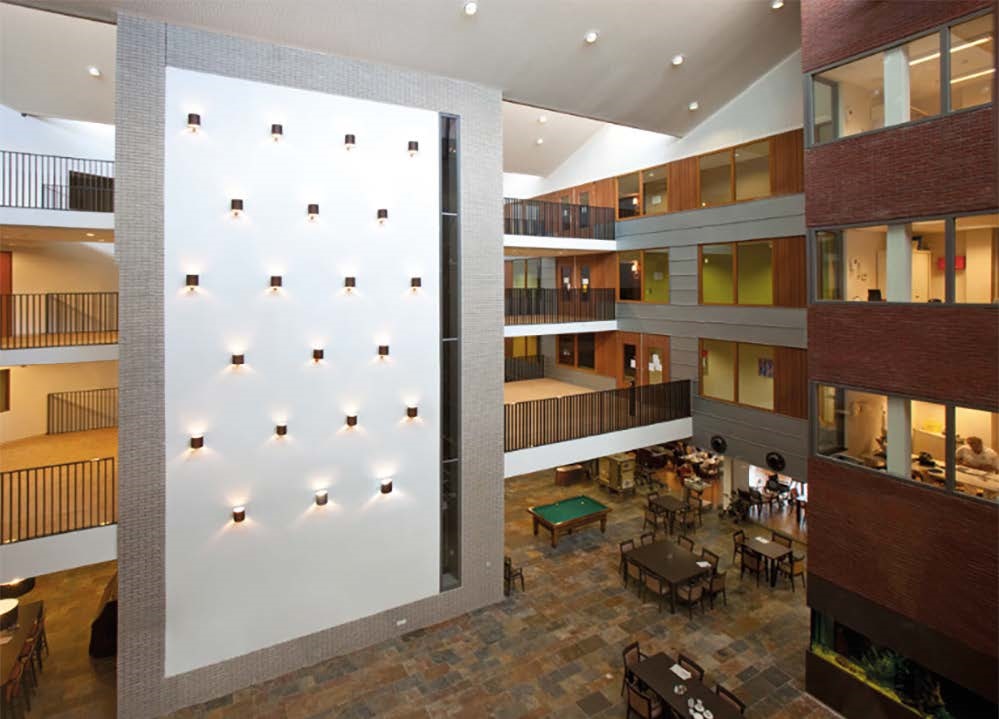Oosterheem
HD air filter saves residential building €12,500 per year
Thuisvester, a housing corporation located in Oosterhout, manages some 13,500 rental units. The organisation strives for improving the housing and living quality of residents. A nice environment is worked towards, with a forward-looking approach. Michel Bakermans, Management & Innovation employee: ‘Our focus lies on good, appropriate and affordable residences and on the quality of the living environment. We make efforts to control housing expenses for our clients and to improve living comfort. A great example of this is our assisted living complex Oosterheem.’
Optimal combination of living enjoyment and sustainable climate control
Thuisvester realised the assisted living complex Oosterheem in 2009; it consists of 100 assisted-living apartments and 24 sheltered housing units. Bakermans: ‘For the past 7 years, all assisted living buildings must be cooled. That is legally required. Our assisted living complex makes use of sustainable cold and heat storage for warming and cooling, also called geothermal heating. With that, we save on costs of climate control, and it fits entirely with our efforts to provide affordable housing within a high-quality living environment.’ Groundwater lends itself outstandingly to the storage of warmth and cold. In the summer, people use the cool groundwater in order to cool the complex. The heated water is then again stored in the earth and used in the winter to heat the complex. The groundwater is already perfect for cooling. For heating, the water has to be heated further with a heat pump that is connected to the source.
Saving on air treatment
‘After a while, we noticed that the energy usage of the building was higher than we had expected’, says Bakermans. Together with our installer Kuijpers, we searched for the cause. Heiki Claeys, project manager for Kuijpers: ‘The great thing about this complex is that it has separate energy meters. That means installations like the heat pump and the air filters are measured separately. This let us see pretty quickly that the ventilation of the complex used a relatively high amount of power.’ Claeys got in touch with AFPRO Filters. ‘We looked together for a filter with lower resistance, which would decrease the energy use.’
‘An HD filter has a larger capture capacity. The intake pressure is much lower and remains lower throughout the entire time of use. We went from a usage of 20,000 kWh per month to 12,000 kWh.’ Heiki Claeys, project leader for Kuijpers
HD filter saves 8,000 kWh per month
In the end, Claeys choose an HD filter. ‘This kind of filter has a larger capture capacity. The intake pressure is much lower and remains lower throughout the entire time of use. We went from a usage of 20,000 kWh per month to 12,000 kWh. If you consider that one kilowatt hour costs an average of 13 cents, you can see that the replacement of the filters was no burden to Thuisvester.’ The assisted living complex now saves, just from replacing the air filters, more than 1,000 euros per month. Thanks to that, no further changes to the filter system were needed. Bakermans: ‘We can just see on the meter that the new filters save energy. The tenants benefit from that. We are talking about a savings of more than 100 euros per year per residence. I am also very happy with the input from our installer’.
‘We can just see on the meter that the new filters save energy. The tenants benefit from that. We are talking about a savings of more than 100 euros per year per residence‘, Michel Bakermans, Management & Innovation employee for Thuisvester.
 Longer use time ensures further cost savings
Longer use time ensures further cost savings
‘The savings will probably be even higher’, Claeys continues. ‘The new filters are more expensive to purchase, but, as a result of a larger capture capacity, they have a much longer use time. Previously, we replaced the filters four times per year. We replace these HD filters an average of 1 to 2 times per year. That delivers savings in materials, labour costs and waste removal.’
Improvement of the air quality
The lower operating power of the air treatment units now has a third benefit. Bakermans: ‘We try to optimise the air quality in our residences. One of the things that we look at is the speed of the air flow. We try to keep this as low as possible. People namely experience air flow as drafts. That is why the residences in our complex do not have the standard two, but three air filters. This keeps the air speed low. Lower operating power of the air treatment units makes a positive contribution here.’
Both Bakermans and Claeys are also very satisfied with the collaboration with AFPRO Filters. Claeys: ‘We have worked very well with AFPRO Filters for years. It is really great that they helped us problem-solve and search for the right solution.’




